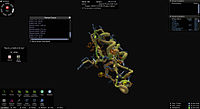Foldit
| Foldit
|
|
|---|---|
 Screenshot of Foldit during a puzzle |
|
| Basic data
|
|
| developer |
University of Washington Departments of Computer Science & Engineering and Biochemistry |
| Current version | ongoing beta |
| operating system | Windows , Mac OS X , Linux |
| programming language | C ++ |
| License | Freeware for academic and non-commercial use |
| German speaking | Yes |
| fold.it | |
Foldit is an experimental computer game designed to help scientists optimize proteins . It is being developed in collaboration between the Computer Science and Engineering and Biochemistry departments at the University of Washington ; Among other things, many people from the Rosetta @ home project are involved. Foldit's approach is a combination of crowdsourcing and distributed computing . The first public beta version was released in May 2008.
Design and aim of the game
The aim of the game is to get a protein that is “ folded ” as well as possible , ie a model of the protein in the state of energy minimum. That is the form in which it occurs in nature. However, no previous knowledge is required, the evaluation is done by the program. The possibilities that the player has for protein manipulation are explained in a series of tutorial puzzles . For the game, a graphic correspondence of the protein structure is displayed, which the player can change with various tools.
If the structure is changed, the program calculates a score based on how well the protein is folded. For each puzzle a high score is calculated for both individual and group solutions, which changes in real time.
The process by which living things synthesize the primary structure of a protein , protein biosynthesis , is fairly well understood, as is coding as DNA . Determining how a protein's primary structure turns into a functioning, three-dimensional structure - how the protein folds - is more difficult. The general process is known, but the prediction of protein structures requires a lot of computing time , which increases sharply with increasing length of the protein, and is imperfect.
Foldit is an attempt to apply the natural human 3-D pattern recognition skills to this problem. Current puzzles are based on well-understood proteins. By examining how players intuitively approach these puzzles, the scientists are trying to improve existing protein folding software. In 2008, Foldit took part in the protein prediction competition CASP 8 and performed very well despite the players' little experience and partly immature tools. In half of the cases a top 3 placement was achieved and once the top spot (with 71 to 83 participating laboratories, two times 527). In every single case, all models that were only calculated by computers were outperformed.
successes
M-PMV protease
In September 2011, Foldit deciphered the structure of the monomeric protein M-PMV protease (Mason-Pfizer monkey virus retroviral protease) , which causes AIDS in rhesus monkeys .
Diels-Alderase
In January 2012 it was announced that Foldit players had succeeded in redesigning a protein with an activity 18 times higher than the original. The protein is a computer-created enzyme that catalyzes the Diels-Alder reaction . The Foldit players revised the enzyme by adding 13 amino acids , increasing its activity 18-fold.
Awards
- Special prize of the jury of the German Computer Game Prize 2020
See also
literature
- Christopher B Eiben, Justin B Siegel, Jacob B Bale, Seth Cooper, Firas Khatib, Betty W Shen, Foldit Players, Barry L Stoddard, Zoran Popovic & David Baker: Increased Diels-Alderase activity through backbone remodeling guided by Foldit players. In: Nature Biotechnology . January 2012, ISSN 1546-1696 . doi : 10.1038 / nbt.2109 .
- Firas Khatib, Seth Cooper, Michael D. Tyka, Kefan Xu, Ilya Makedon, Zoran Popović, David Baker, and Foldit Players: Algorithm discovery by protein folding game players. In: Proceedings of the National Academy of Sciences of the United States of America . November 2011, ISSN 1091-6490 . doi : 10.1073 / pnas.1115898108 .
- F. Khatib, F. Dimaio, S. Cooper, M. Kazmierczyk, M. Gilski, S. Krzywda, H. Zabranska, I. Pichova, J. Thompson, Z. Popović, M. Jaskolski, D. Baker: Crystal structure of a monomeric retroviral protease solved by protein folding game players. In: Nature structural & molecular biology . September 2011, ISSN 1545-9985 . doi : 10.1038 / nsmb.2119 . PMID 21926992 .
- S. Cooper, F. Khatib, A. Treuille, J. Barbero, J. Lee, M. Beenen, A. Leaver-Fay, D. Baker, Z. Popović, F. Players: Predicting protein structures with a multiplayer online game . In: Nature . Volume 466, Number 7307, August 2010, pp. 756-760, ISSN 1476-4687 . doi : 10.1038 / nature09304 . PMID 20686574 . PMC 2956414 (free full text).
Web links
- Official website
- International Foldit Wiki
- German Foldit Wiki
- YouTube: Topic - Foldit Videos about "Foldit"
- Folding proteins as an online pastime in the Neue Zürcher Zeitung on September 28, 2011
Individual evidence
- ↑ CENTER FOR COMMERCIALIZATION University of Washington Foldit Standalone
- ↑ Gamers clarify the structure of a virus enzyme . Spiegel Online, September 19, 2011.
- ^ Alan Boyle: Gamers solve molecular puzzle that baffled scientists . Cosmic Log, September 18, 2011.
- ↑ F. Khatib, F. Dimaio, S. Cooper, M. Kazmierczyk, M. Gilski, S. Krzywda, H. Zabranska, I. Pichova, J. Thompson, Z. Popović, M. Jaskolski, D. Baker: Crystal Structure of a monomeric retroviral protease solved by protein folding game players. In: Nature structural & molecular biology. September 2011. ISSN 1545-9985 . doi : 10.1038 / nsmb.2119 . PMID 21926992 .
- ↑ Christopher B Eiben, Justin B Siegel, Jacob B Bale, Seth Cooper, Firas Khatib, Betty W Shen, Foldit Players, Barry L Stoddard, Zoran Popovic & David Baker: Increased Diels-Alderase activity through backbone remodeling guided by Foldit players. In: Nature Biotechnology . January 2012, ISSN 1546-1696 . doi : 10.1038 / nbt.2109 .